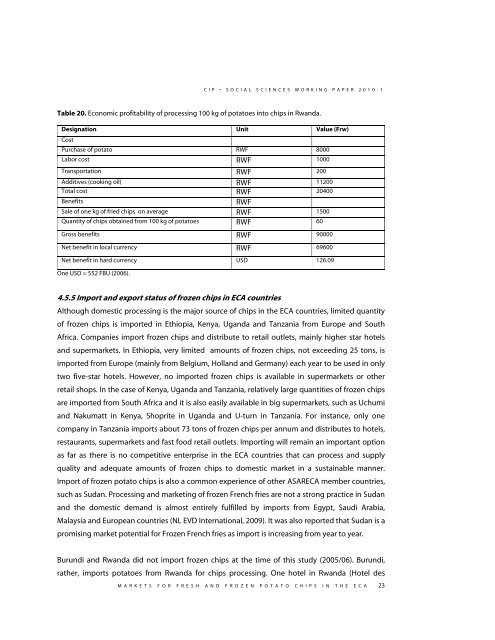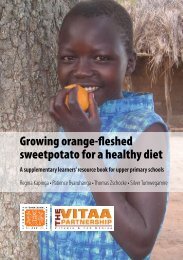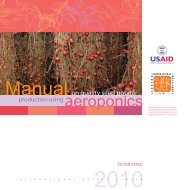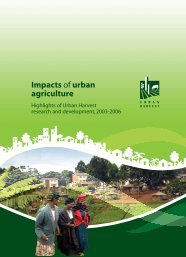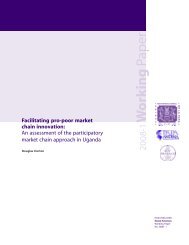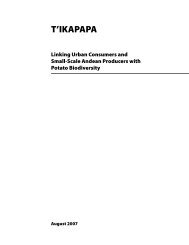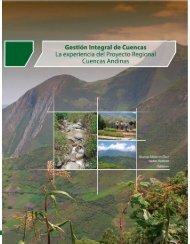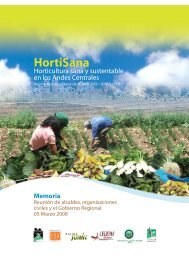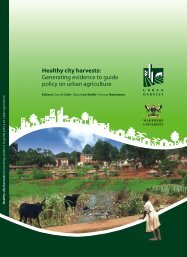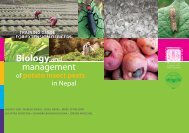Download pdf - International Potato Center
Download pdf - International Potato Center
Download pdf - International Potato Center
You also want an ePaper? Increase the reach of your titles
YUMPU automatically turns print PDFs into web optimized ePapers that Google loves.
CIP • SOCIAL SCIENCES WORKING PAPER 2010-1<br />
Table 20. Economic profitability of processing 100 kg of potatoes into chips in Rwanda.<br />
Designation Unit Value (Frw)<br />
Cost<br />
Purchase of potato RWF 8000<br />
Labor cost RWF 1000<br />
Transportation RWF 200<br />
Additives (cooking oil) RWF 11200<br />
Total cost RWF 20400<br />
Benefits<br />
RWF<br />
Sale of one kg of fried chips on average RWF 1500<br />
Quantity of chips obtained from 100 kg of potatoes RWF 60<br />
Gross benefits RWF 90000<br />
Net benefit in local currency RWF 69600<br />
Net benefit in hard currency USD 126.09<br />
One USD = 552 FBU (2006).<br />
4.5.5 Import and export status of frozen chips in ECA countries<br />
Although domestic processing is the major source of chips in the ECA countries, limited quantity<br />
of frozen chips is imported in Ethiopia, Kenya, Uganda and Tanzania from Europe and South<br />
Africa. Companies import frozen chips and distribute to retail outlets, mainly higher star hotels<br />
and supermarkets. In Ethiopia, very limited amounts of frozen chips, not exceeding 25 tons, is<br />
imported from Europe (mainly from Belgium, Holland and Germany) each year to be used in only<br />
two five-star hotels. However, no imported frozen chips is available in supermarkets or other<br />
retail shops. In the case of Kenya, Uganda and Tanzania, relatively large quantities of frozen chips<br />
are imported from South Africa and it is also easily available in big supermarkets, such as Uchumi<br />
and Nakumatt in Kenya, Shoprite in Uganda and U-turn in Tanzania. For instance, only one<br />
company in Tanzania imports about 73 tons of frozen chips per annum and distributes to hotels,<br />
restaurants, supermarkets and fast food retail outlets. Importing will remain an important option<br />
as far as there is no competitive enterprise in the ECA countries that can process and supply<br />
quality and adequate amounts of frozen chips to domestic market in a sustainable manner.<br />
Import of frozen potato chips is also a common experience of other ASARECA member countries,<br />
such as Sudan. Processing and marketing of frozen French fries are not a strong practice in Sudan<br />
and the domestic demand is almost entirely fulfilled by imports from Egypt, Saudi Arabia,<br />
Malaysia and European countries (NL EVD <strong>International</strong>, 2009). It was also reported that Sudan is a<br />
promising market potential for Frozen French fries as import is increasing from year to year.<br />
Burundi and Rwanda did not import frozen chips at the time of this study (2005/06). Burundi,<br />
rather, imports potatoes from Rwanda for chips processing. One hotel in Rwanda (Hotel des<br />
M A R K E T S F O R F R E S H A N D F R O Z E N P O T A T O C H I P S I N T H E E C A 23


